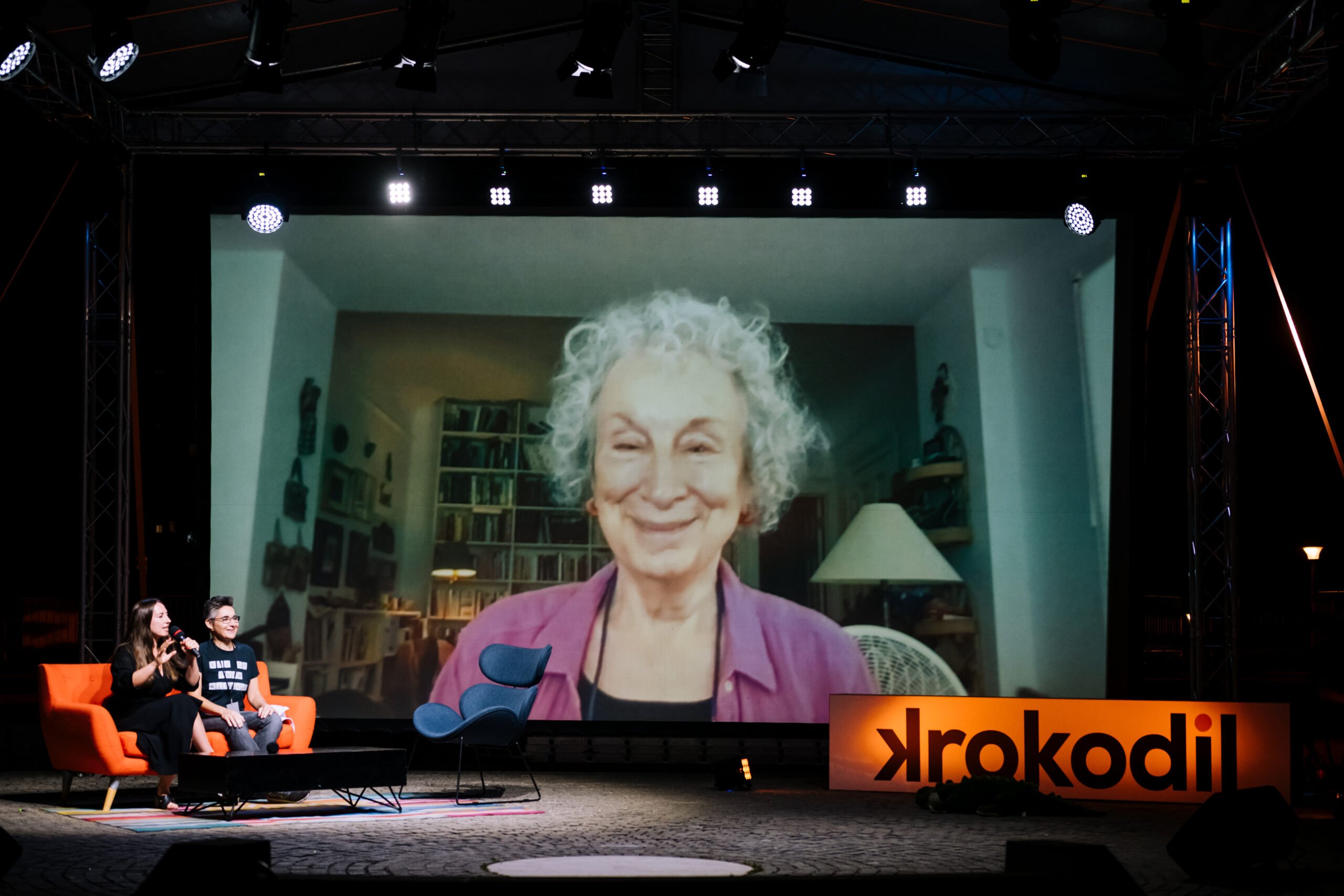
19 Jul Margaret Atwood: I Wish My Book Weren’t Relevant / Report from the first evening of the Krokodil Festival
The Year of Magical Thinking is the title of the fourteenth Krokodil literary festival, which was opened last night at its traditional place, in front of the Museum of Yugoslavia. This year’s edition was dedicated to the recently deceased American author Joan Didion.
The audience was led through the dynamic and rich festival programme by Mima Simić, who started off by joking that she had gone grey with Krokodil. First on the stage was young author Asja Bakić, who spoke about the importance of polemics in literature. She said that she was not trying to be likeable and that her biggest problem was when people shared on social media political ideas that could hurt others.
‘In my opinion, there is no room for discussions. Fascism is not something you argue with. It’s where you draw a line. No discussion’, said Asja Bakić, who then read her unpublished short story ‘The Last Supper’, written during her residency in Germany.
The charismatic Argentinian author Ariana Harwicz was next on the stage. Talking to the translator Silvia Monros, she spoke about the book Die, My Love, which addresses postpartum depression. Ariana said that the book had caused her many problems but that it had also showed ‘how politicised the whole motherhood story is’.
‘I didn’t let anyone read the manuscript before I gave it to the editor. I was afraid I might get arrested’, said Ariana, smiling.
After she read out a passage from the novel in Spanish, Ariana added that the book was going to be adapted for the screen and that it was important to her that the story was not embellished.
Ariana was seen off the stage with a big round of applause, and author Aleksandar Šurbatović was introduced to the audience. Talking to literary critic, Jasmina Ahmetagić, Aleksandar said that Latin American authors, such as Llosa, Sabato and Fuentes, had a big influence on his writing, and that he would pay homage to these writers in his future works. Aleksandar went on to explain that he had decided to withdraw his novel ‘The Turkish Chess Player’ from all award competitions because he wanted to show writers that ‘you can have a novel out without being motivated by the desire to get an award’.
‘I think we have too many awards in this country. Admittedly, there are too many writers as well. It’s all been devalued’, adds Šurbatović, who also works as an editor for the publishing company Dereta.
The programme continued with the musician and writer Marko Šelić, better known as Marčelo, who made sure that the audience stayed attentive by performing the song ‘JBG’ from his current album ‘Noah’s Ark’. Talking to Mima Simić, he described the album as ‘a novel in verse’ about the period ‘marked by protests’.
Then it was time for the star of the festival. Margaret Atwood spoke to Mima and the North Macedonian author Rumena Bužarovska from her home in Toronto. Margaret shared her memories of Yugoslavia first.
‘Yugoslavia had always been interesting, both geographically and historically, because it used to be considered a crossroads’, she related.
She also talked about The Handmaid’s Tale. She recalled the sneers and scepticism she had encountered when it came out. Then, to the audience’s delight, she read out the introductory paragraph to its first chapter.
Radio host Daško Milinović interviewed Dušan Petričić. They took us on a trip down memory lane, from the early days of the famous cartoonist’s career to the political cartoons he has done later for various newspapers and magazines. Dušan also recalled how he and Corax met and began collaborating.
The night concluded with a touching tribute to actress Mira Furlan. Her colleague, actress Mirjana Karanović, reflected on Mira’s fragile, tender nature and shared what it was like working with her. Mirjana reminded the audience that Mira always spoke openly about life’s injustices and things that hurt and pained her.
‘We were not particularly close, we didn’t hang out together, but I always felt her as one of my kind’, she said about the fellow actress.
Ivan Bevc, the owner of the publishing house Booka, expressed how pleased he was with the success of Mira’s autobiography, Love Me More than Anything in the World, but he disliked how the media focused on the story about actor Rade Šerbedžija.
Mima wrapped the night up by thanking the audience for their interest and attendance. She invited everybody to check out the debate program and urged them not to miss the second evening of the festival.
The report was prepared by KROKODIL journalists for a day: Milica Đorđević, Đorđe Bjelanović, and Sara Nikolić.
The project Journalist for a Day – Journalists against Racism is implemented as part of Reporting Diversity Network 2.0 funded by the European Union.



Sorry, the comment form is closed at this time.